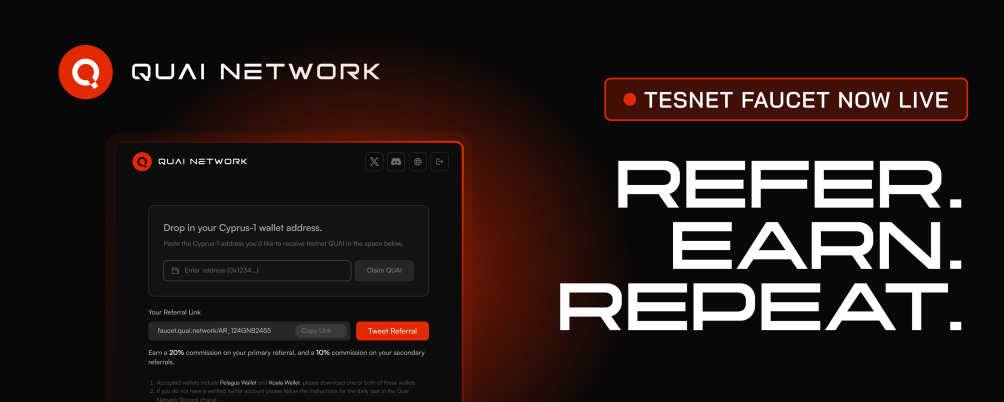
The final date of the testnet has been announced! Read more: Golden Age Completion Date Announced: Paving the Way to Mainnet.
Imagine this: every person you bring into the Quai Network is an investment that pays you back, not just once but over and over again. With the Quai Network Faucet Referral Program, you’re not just earning Testnet $QUAI — you’re building a legacy of rewards.
How It Works
Two Simple Ways to Earn
- Direct Referrals – The 20% Bonus
- When someone uses your referral link and taps into the Faucet, you earn 20% of their Testnet $QUAI rewards. Every time they collect, you collect too. It’s the kind of value that doesn’t just stop after the first round.
- When someone uses your referral link and taps into the Faucet, you earn 20% of their Testnet $QUAI rewards. Every time they collect, you collect too. It’s the kind of value that doesn’t just stop after the first round.
- Secondary Referrals – 10% Back from Extended Connections
- If the people you refer invite others, you earn 10% of each of their rewards. Your network keeps paying you back, branching out, bringing in more with every drop from the Faucet.
A Case in Point
Imagine OG MUDBONE brings Alexis Texas into the fold, and then Alexis Texas invites Judi Sins. Here’s how the rewards start stacking up:
- When Alexis Texas claims from the Faucet: OG MUDBONE earns 1 $QUAI (that’s 20% of 5 $QUAI).
- When Judi Sins claims: Alexis Texas pockets 1 $QUAI (20% of 5 $QUAI), and OG MUDBONE adds another 0.5 $QUAI (10% of 5 $QUAI) to his earnings.
Every claim grows the rewards, expanding the network — and OG MUDBONE keeps earning with each new connection.
The result? Every claim, every invite, every connection grows your rewards. With the Quai Network Faucet Referral Program, you’re creating something bigger — a network that rewards you with each new step forward. So go ahead, build your network, and let Quai Network start working for you.
